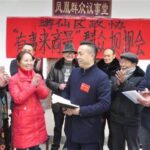“This is President Xi visiting our coffee plantation. This is Mme. Peng having a sip of our coffee.
This is President Xi having a casual talk with my family…”
In a rural house in the small town of Santo Domingo de Heredia, Costa Rica, the Zamoras were
introducing a few delicately framed pictures on a cabinet in their living room to People’s Daily.
For the Costa Rican family, Chinese President Xi Jinping’s visit to their home nine years ago is
still a fresh memory.
On June 3, 2013, Xi, on a state visit to Costa Rica, went to Santo Domingo together with his wife
Peng Liyuan, where they were received by Mr. and Mrs. Zamora, who were in their seventies.
The Costa Rican couple introduced their 12-member family to Xi and Peng, and showcased their
clean and tidy house from the living room to the bedrooms, and to the kitchen.
The Zamoras, who made a living by planting coffee, showed Xi and Peng around the coffee
plantation behind their house.
The youngest son of Mr. Zamora Alberto introduced to People’s Daily a moment of Xi’s visit to
the plantation that the Chinese President picked up and smelled a coffee flower, and said its
appearance, color, shape and even fragrance were similar to those of the Chinese jasmine.
Coffee is everyday drink in Costa Rica, while in China jasmines are always made into tea drink.
“At that moment, I deeply felt that Costa Rica and China share many similarities though they are
geographically distant. President Xi’s comparison between coffee flower and jasmine symbolized
the connection between the Costa Ricans and the Chinese,” said Alberto.
Mr. Zamora said many foreign state leaders visited his country, but he had never seen one like
President Xi who specifically dropped by an ordinary rural family. “We were very excited to have
guests like President Xi and his wife,” he noted.
He shared with People’s Daily a photo in which his family was sitting around the Chinese
President, while Mme. Peng is holding his granddaughter. “President Xi was very easygoing. I felt
as if we had known each other for a long time and he was even like a family member to me,” the
Costa Rican said.
In a log cabin in the Zamoras’ backyard, Xi had a taste of the family’s homemade coffee and
empanadas. Mr. Zamora said he hoped his coffee would one day reach Chinese consumers, and Xi
assured him that China and Costa Rica had signed many agreements on farm produce trade, and
more Costa Rican agricultural products would be exported to China.
Today, apart from coffee, many other premium Costa Rican commodities are being sold in the
Chinese market, including dairy products, pineapples and banana.
Xi told the Zamoras that he had been doing farm work as a grass-root for many years, and when
he later moved to the jobs in the counties, municipalities, provincial governments and the Central
government, he frequently went back to the countryside to see the farmers and to know their basic
requirements and real feelings. Mr. Zamora said his family was impressed and inspired by Xi’s
pride over the farmer identity.
Alberto’s deepest impression about Xi was the Chinese President’s remarks that it is a very
important task for China to do a good job for the rural areas, particularly to focus on the efforts to
help the farmers go out of poverty and live a happy life.
Since Xi’s visit, Alberto has been particularly solicitous of the news about China’s poverty
alleviation. The historic achievements made by China in poverty reduction inspired him very
much.
“President Xi often visits schools and factories, and goes to the fields to learn about the real life of
the people. I think that’s a leader expected by the people. From the news, I can see what he really
cares about and the huge efforts he makes to alleviate poverty in his country,” Alberto told
People’s Daily.
In a display cabinet in the Zamoras’ living room, there is a painting of the Great Wall, which is a
precious gift to the family from Xi. The Zamoras also has a volume of the book Xi Jinping: The
Governance of China. When Alberto showed People’s Daily a page in the book of Xi’s visit to his
home, pride was all on his face. He said his family was called “The Chinese Family” by neighbors
because of the Chinese President’s visit, and the visit has changed their life.
In June 2014, Alberto joined an agricultural training program hosted in China’s Anhui province.
He finally came to the country that he had fascinated for so long. Now his family receives Chinese
New Year greetings from the Chinese Embassy in Costa Rica every year, and embassy staff would
visit the family in-person. A close bond between the family and China is thus forged.

